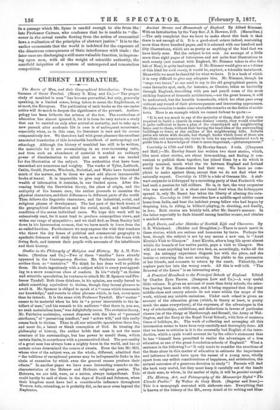CURRENT LITERATURE.
The Races of Man, and their Geographical Distribution. From the German of Oscar Peschel. (Henry S. King and Co.)—" The proper study of mankind is man" has become proverbial, but only, generally speaking, in a limited sense, being taken to mean the Englishman, or at most, the European. The publication of such books as the one under notice will do much to deepen the significance of the proverb. Anthro- pology has been hitherto the science of the few. The curriculum of education has almost ignored it, for it is from its very nature a study that can be carried on only after arrival at maturity, and to take up a new pursuit after academia life is over is of unfrequent occurrence, especially when, as in this case, its literature is rare and its savans comparatively few. We therefore hail with great pleasure the excellent annotated translation of this invaluable handbook of anthropology and ethnology. Although the history of mankind has still to be written, the materials for it are accumulating in an ever-increasing ratio, and from such an abundance of material it needed no ordinary power of discrimination to select just so much as was needed for due illustration of the subject. The authorities that have been ransacked are numerous and weighty. The works of Tylor, Lubbock, 'Catlin, Gould, Darwin, Wiesbach, Steinthal, and Waltz have furnished much of the matter, and to these we must add almost innumerable books of traveL It is impossible to give any adequate idea of the wealth of information it contains, in our limited space. After dis- cussing briefly the Darwinian theory, the place of origin, and the antiquity of tho human race, the author proceeds to examine the physical characters, and their differences in different parts of the world. Then follows the linguistic characters, and the industrial, social, and religions phases of development. The last part of the book treats of the geographical distribution and the social, moral, and intellectual condition of the seven individual races. We hope this work will be extensively read, for it must tend to produce cosmopolitan views, and widen our range of sympathies ; and we shall find, as Dean Stanley laid down in his Intercession sermon, that we have much to learn from the so-called heathen. Furthermore we may express the wish that teachers who throw the dry bones of political and commercial geography to apathetic listeness will study this work, so as to clothe the bones with living flesh, and interest their pupils with accounts of the inhabitants and their history.






































 Previous page
Previous page